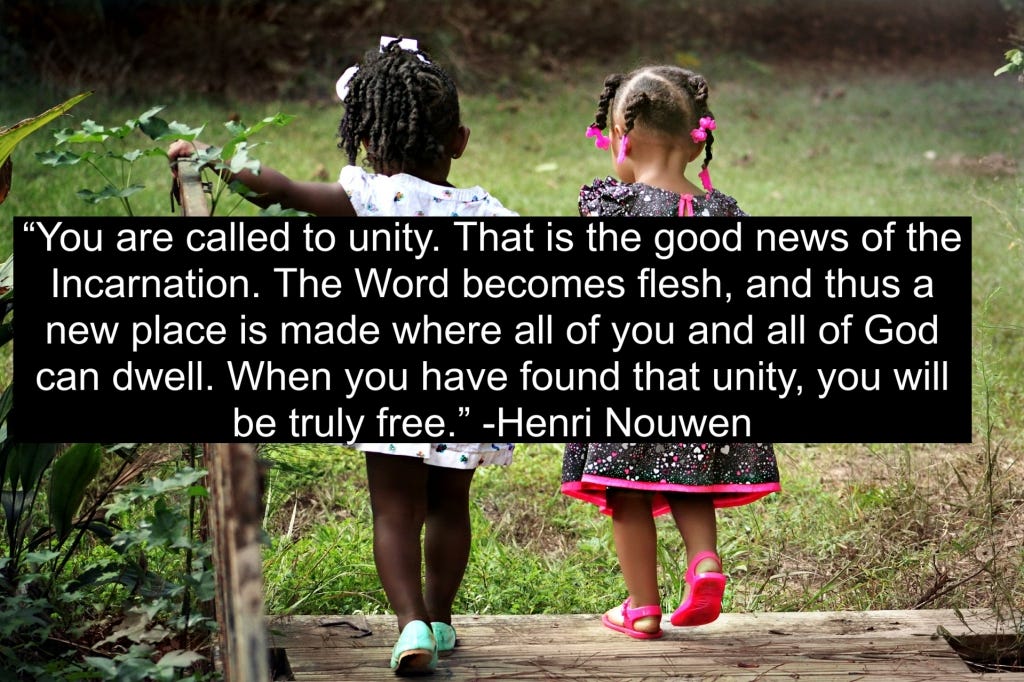The Radical Incarnation
Thank you to Megan Westra for the summer book study on Henri J.M Nouwen’s, The Inner Voice of Love. For the next few weeks I will be sharing my reflections based on the reading.
“You are called to unity. That is the good news of the Incarnation. The Word becomes flesh, and thus a new place is made where all of you and all of God can dwell. When you have found that unity, you will be truly free.”
As I’ve deconstructed and reconstructed my faith over the years, I have rejected a lot of theological beliefs I used too insist were without a doubt correct: such as the notion of a God that sends people to hell for not believing in Christianity or the right type of Christianity. Or the idea that Genesis is a literal scientific text that explains the origins of the world and stands in opposition to evolution. Or in the idea that during the end times God will save a certain number of people and basically tell everyone else to, "fuck off."
But there is one notion that I continue to hold onto even as I let go of other theological ideas: the incarnation. I won’t even pretend that the incarnation is logically or even scientifically possible or that it is something Christians can prove occurred. We can’t. But the idea still draws me and captivates me. The notion of a God made flesh and blood. So many different forms of Christianity talk a lot about the incarnation but they also depict God as some aloof, all powerful figure that is somehow above all the hassle and messiness of humanity. In fact, the incarnation is viewed as a brief exception to God’s more natural state. God became human for about 33 years and when Jesus died, he went back to heaven and returned to his state as an eternal floating spirit. Or rather that’s how it always sounded like to me when pastors talked about Jesus’ resurrection, whether that was their intent, I don’t know.
But for me, the incarnation was not just God’s brief foray into the mess that is humanity. Instead it stands as a testament to God’s desire for unity. Nouwen, in his reflection “Trust in the Place of Unity” encourages us to get to the place in our lives where duality no longer reigns. This place of unity encompasses the essence of who we are our-our emotions, our physical bodies, our thoughts etc.
I, for one that I am guilty of dualistic thinking. I view my body as often less important than my spirit or intellect, as if I can badly treat my body or ignores its needs and not have it negatively impact my spiritual or mental health. I tend to lump emotions into “good” or “bad” or “strong” or “weak.” Happiness and joy are good emotions, everything else is bad. Anger is a “strong” emotion while sadness and disappointment are “weak” and therefore useless. Unfortunately, some forms of Christianity actually embrace dualism, though they wouldn’t use that term. They tell people that certain emotions are “Unchristian’ such as fear. They depict the body as bad and sinful. In essence, despite their insistence that the incarnation of Jesus is a key theological concept, in practice they reject the unity that the incarnation encourages.
The idea of God becoming human through Jesus means that God experienced emotion. Jesus cried, he felt anger, he felt despair and abandonment. God also lived in a body. Jesus experienced hunger, exhaustion, physical pain. God didn’t run away from human emotion or pain but instead embraced it.
So much of Christianity is focused on the incarnation as a way for God to appease God’s anger and provide an escape valve for a select few number of humans to avoid hell, that the radicalness of the incarnation is ignored. The incarnation says that God loved humanity so much that God embraced every facet of humanity including the parts that we so often want to deny. Jesus spoke a lot of what we would call “spiritual truths’ but he also spoke about hunger, poverty, pain and sorrow. Spirituality and the very real conditions of our daily existence are not diametrically opposed. And the incarnation demonstrates that we believe in a God that embraces all aspects of human life as worthwhile.
God is calling us to embrace ourselves-our whole selves, our bodies, our emotions, our desires, our needs. We aren’t to deny key aspects of ourselves in a misguided attempt to be “holy.” Jesus embraced being human. Perhaps, we should as well.



